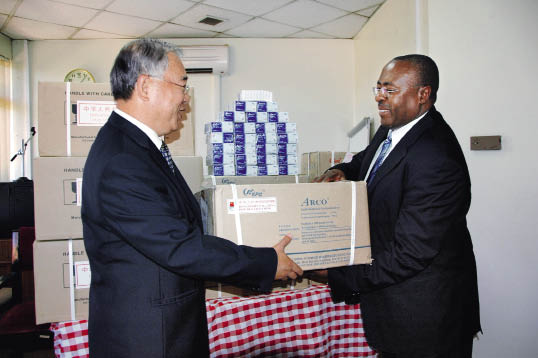Chinese Anti-malaria Drugs Stand up to Tests
By YUAN JIRONG, SHI PENGFEI, FU ZIMEI, WANG KE & CHENG HUI
 |
| On January 18, 2010, Chinese ambassador to Uganda Sun Heping, representing the Chinese government, donated anti-malaria drugs worth US $400,000 to the Ugandan government. The picture shows Mr. Sun presenting the donated drugs to Ugandan Health Minister Richard Nduhura. |
A report in UK-based newspaper The Guardian at the end of last year cited China as a possible source of the counterfeit drugs in certain African countries that are impeding the battle against malaria. As much as a third of anti-malaria drugs in Tanzania and Uganda are fake or substandard, the article said, and most are believed to have originated in China and India. Chinese reporters have since carried out investigations in Tanzania and Uganda to assess quality control standards applicable to imported anti-malaria drugs. They found that Chinese anti-malaria drugs entering Africa through national overseas aid programs or foreign trade undergo strict supervision procedures in both China and the importing countries, and that they stand up to the most stringent of tests and inspections.
Chinese Medicines Welcomed
“I have no idea on what evidence the Guardian report is based. Its accounts are far-fetched,” was the comment of chief of the Tanzania Malaria Control Program Mohamed Ali. Imported anti-malaria drugs undergo a stringent inspection and management process, according to Ali. As the drugs are mainly air freighted, they come under the supervision of the Tanzania food and drugs authority.
“Chinese-made anti-malaria drugs are effective, fast-acting and have few side-effects,” said Doctor Bushari of the Mmoja Hospital in Dar es Salaam, capital of Tanzania. “I use Chinese drugs myself and recommend them to my patients.”
Charys Nuhu Ugullum, acting chief of Tanzania’s food and drugs authority, praised China’s contributions to Tanzania’s battle against malaria and to the country’s healthcare system. Ugullum said that he has always found Chinese-manufactured anti-malaria dugs to be effective. He is looking forward to cooperating with Chinese practitioners of traditional Chinese medicine. Ugullum also confirmed that China is helping Tanzania achieve its goal of independently producing anti-malaria medicine by working with the country on the construction of pharmaceutical manufacturing facilities.
Jasson Urbach, South African director of Africa Fighting Malaria, said during an interview that China-made drugs are of good quality and competitively priced. They generally include the herbal extract artemisinin, which destroys malarial parasites in human hosts.
Chinese commercial counselor in Uganda Ouyang Daobing confirmed that anti-malaria drugs provided by China have saved the lives of millions of Africans. Those containing artemisinin entered the Uganda market at the end of the 1990s. Compared with traditional Western anti-malaria pharmaceuticals, whose primary active ingredient is quinine, those containing artemisinin are easier to use, cheaper and have fewer side-effects. The Chinese government has provided a total 1,737,790 boxes of anti-malaria drugs since 2006 through its aid program to Uganda.
Marketing manager at Hofon Contec Pharmaceutical Corporation Tanzania branch Mr Kissandu explained to Chinese reporters that it is the prevalence of mosquitoes and flies that thrive in the hot, steamy climate of African countries, and most certainly not China-made drugs entering the African market, that makes it difficult to curb outbreaks of malaria. Medicines from China account for no more than 10 percent of the market share in Tanzania. He added that since anti-malaria medicine such as China-made artemisinin entered Africa, the continent has made great progress in malaria prevention and cures. For example, until two years ago malaria caused the deaths of 100,000 or more people every year. That this statistic fell to 25,000 in 2012 is largely attributable to China-made medicine.
Stringent Import Procedures
Chinese medicines enter the African market through two major channels. One is that of China-to-Africa aid programs; the second by public procurements by international organizations and pharmaceutical companies, which set up branches in target countries for direct sales of China-made medicines.
“With regards to aid programs, the quality of all China-made anti-malaria medicines is guaranteed. They undergo inspection procedures both in the country of origin and when passing through customs,” Ministry of Commerce official Zhu Zhenghong said. Publicly procured drugs and drug producers must be WHO-accredited. The World Health Organization set up a pre-qualification system in 2004 to ensure the quality of HIV/AIDS, malaria and tuberculosis medications obtained through international public procurement. In the private sector, as in aid programs, drugs exported to Africa undergo stringent supervision and inspection procedures from the point of manufacture through to being prescribed.

